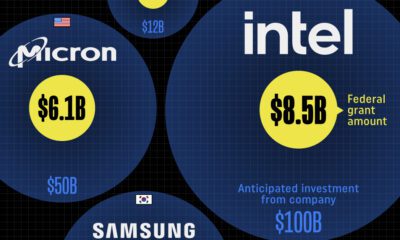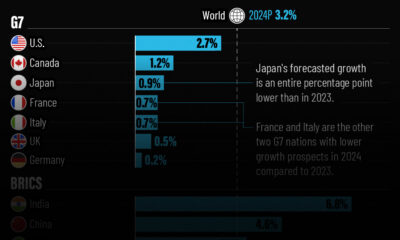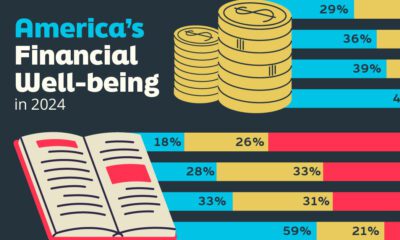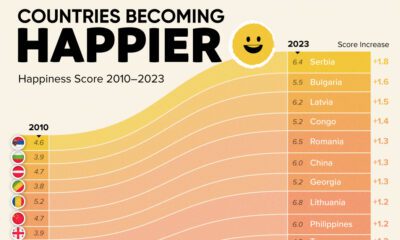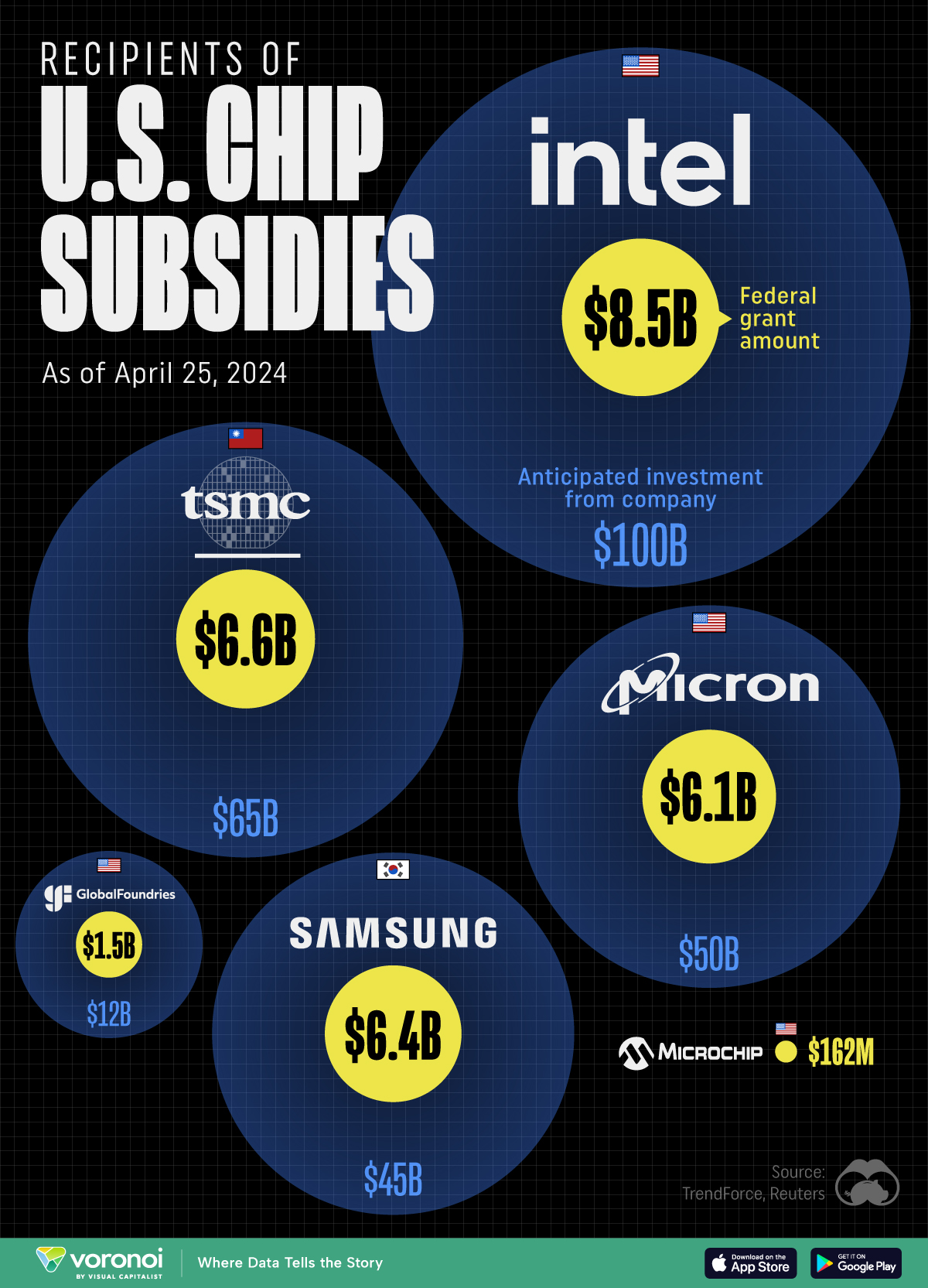Technology
Ranked: Largest Semiconductor Foundry Companies by Revenue
![]()
Ranked: Largest Semiconductor Foundry Companies by Revenue
They’re in our phones, cars, planes, and even fridges.
Semiconductor chips have become critical for the modern way of life, and the biggest semiconductor foundry companies rake in billions of dollars from widespread demand.
This chart shows the largest semiconductor foundry companies by their percentage of global revenues in Q1 2023, using data sourced from Trendforce.
Semiconductor Foundry Companies by Revenue
At the top of the list and dwarfing every other company by revenue share is TSMC which earned 60% (or nearly $17 billion) of the entire industry’s revenue in Q1 2023.
Founded in 1987, TSMC is a pure-play foundry that has become Taiwan’s largest company and manufactures products for a host of clients including Apple, NVIDIA, and AMD.
| Rank | Company | Country | Revenue (Q1 2023, USD) |
|---|---|---|---|
| 1 | TSMC | 🇹🇼 Taiwan | $16,735M |
| 2 | Samsung | 🇰🇷 South Korea | $3,446M |
| 3 | GlobalFoundries | 🇺🇸 US | $1,841M |
| 4 | UMC | 🇹🇼 Taiwan | $1,784M |
| 5 | SMIC | 🇨🇳 China | $1,462M |
| 6 | HuaHong Group | 🇨🇳 China | $845M |
| 7 | Tower Semiconductor | 🇮🇱 Israel | $356M |
| 8 | PSMC | 🇹🇼 Taiwan | $332M |
| 9 | VIS | 🇹🇼 Taiwan | $269M |
| 10 | DB Hitek | 🇰🇷 South Korea | $234M |
| Other | $556M | ||
| Global Total | $27,860M |
Note: Revenue based on the following conversion rates: USD 1 = WON 1,276; USD 1 = NTD 30.4.
Well behind TSMC in foundry revenues is integrated device manufacturer Samsung, the biggest company in South Korea, which made $3.4 billion (12.4% of the industry’s revenue) from its semiconductor manufacturing business.
GlobalFoundries from the U.S., UMC from Taiwan and SMIC from China round out the top five, with each taking home around 6% of industry’s revenue share in Q1 2023. The former spun out from AMD’s manufacturing arm when the company went fabless in 2009.
Industry concentration is apparent in semiconductors. For example, the top 10 semiconductor foundry companies account for 98% of the entire industry’s revenue. Furthermore, 90% of the market is dominated by companies in just three Asian countries: Taiwan, South Korea, and China.
Technology
All of the Grants Given by the U.S. CHIPS Act
Intel, TSMC, and more have received billions in subsidies from the U.S. CHIPS Act in 2024.
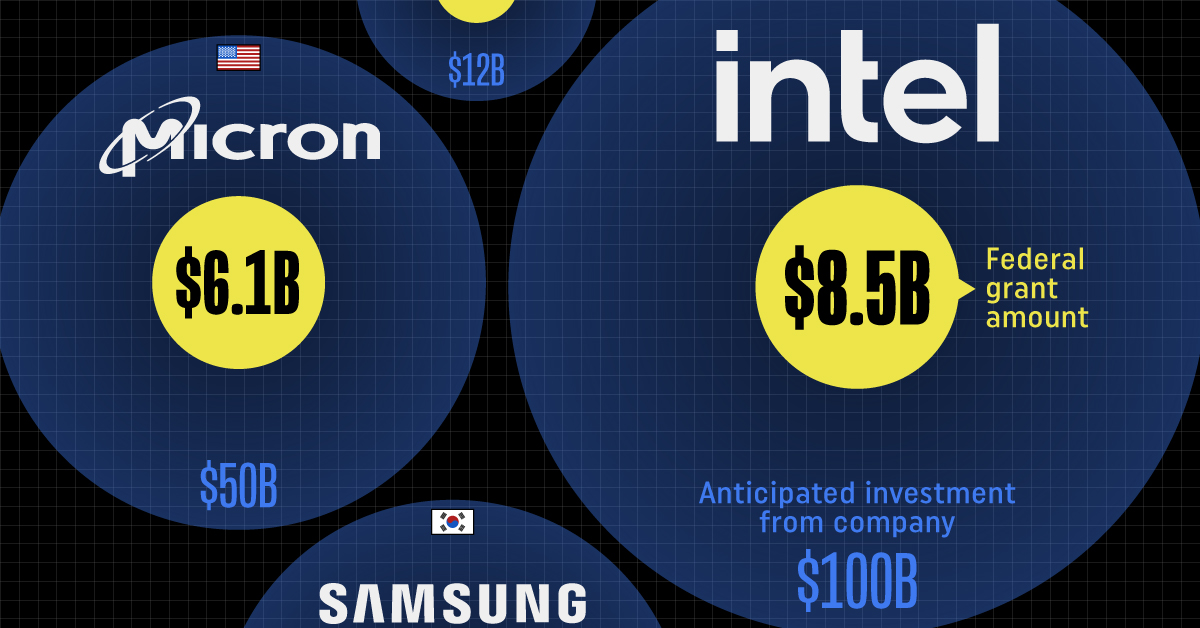
All of the Grants Given by the U.S. CHIPS Act
This was originally posted on our Voronoi app. Download the app for free on iOS or Android and discover incredible data-driven charts from a variety of trusted sources.
This visualization shows which companies are receiving grants from the U.S. CHIPS Act, as of April 25, 2024. The CHIPS Act is a federal statute signed into law by President Joe Biden that authorizes $280 billion in new funding to boost domestic research and manufacturing of semiconductors.
The grant amounts visualized in this graphic are intended to accelerate the production of semiconductor fabrication plants (fabs) across the United States.
Data and Company Highlights
The figures we used to create this graphic were collected from a variety of public news sources. The Semiconductor Industry Association (SIA) also maintains a tracker for CHIPS Act recipients, though at the time of writing it does not have the latest details for Micron.
| Company | Federal Grant Amount | Anticipated Investment From Company |
|---|---|---|
| 🇺🇸 Intel | $8,500,000,000 | $100,000,000,000 |
| 🇹🇼 TSMC | $6,600,000,000 | $65,000,000,000 |
| 🇰🇷 Samsung | $6,400,000,000 | $45,000,000,000 |
| 🇺🇸 Micron | $6,100,000,000 | $50,000,000,000 |
| 🇺🇸 GlobalFoundries | $1,500,000,000 | $12,000,000,000 |
| 🇺🇸 Microchip | $162,000,000 | N/A |
| 🇬🇧 BAE Systems | $35,000,000 | N/A |
BAE Systems was not included in the graphic due to size limitations
Intel’s Massive Plans
Intel is receiving the largest share of the pie, with $8.5 billion in grants (plus an additional $11 billion in government loans). This grant accounts for 22% of the CHIPS Act’s total subsidies for chip production.
From Intel’s side, the company is expected to invest $100 billion to construct new fabs in Arizona and Ohio, while modernizing and/or expanding existing fabs in Oregon and New Mexico. Intel could also claim another $25 billion in credits through the U.S. Treasury Department’s Investment Tax Credit.
TSMC Expands its U.S. Presence
TSMC, the world’s largest semiconductor foundry company, is receiving a hefty $6.6 billion to construct a new chip plant with three fabs in Arizona. The Taiwanese chipmaker is expected to invest $65 billion into the project.
The plant’s first fab will be up and running in the first half of 2025, leveraging 4 nm (nanometer) technology. According to TrendForce, the other fabs will produce chips on more advanced 3 nm and 2 nm processes.
The Latest Grant Goes to Micron
Micron, the only U.S.-based manufacturer of memory chips, is set to receive $6.1 billion in grants to support its plans of investing $50 billion through 2030. This investment will be used to construct new fabs in Idaho and New York.
-
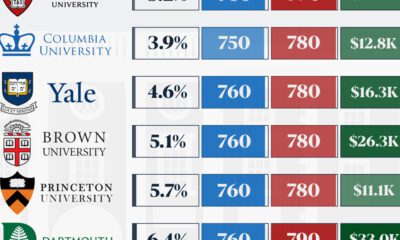
 Education1 week ago
Education1 week agoHow Hard Is It to Get Into an Ivy League School?
-

 Technology2 weeks ago
Technology2 weeks agoRanked: Semiconductor Companies by Industry Revenue Share
-

 Markets2 weeks ago
Markets2 weeks agoRanked: The World’s Top Flight Routes, by Revenue
-

 Demographics2 weeks ago
Demographics2 weeks agoPopulation Projections: The World’s 6 Largest Countries in 2075
-

 Markets2 weeks ago
Markets2 weeks agoThe Top 10 States by Real GDP Growth in 2023
-

 Demographics2 weeks ago
Demographics2 weeks agoThe Smallest Gender Wage Gaps in OECD Countries
-

 Economy2 weeks ago
Economy2 weeks agoWhere U.S. Inflation Hit the Hardest in March 2024
-

 Green2 weeks ago
Green2 weeks agoTop Countries By Forest Growth Since 2001
